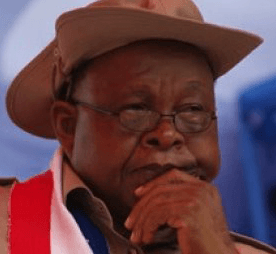Speaker of Parliament asks UK to help Africa devise new economic paradigm

Professor Aaron Michael Oquaye, the Speaker of Parliament, has proposed to the United Kingdom to partner Africa devise a new paradigm for economic partnership which will seriously consider the economic welfare of Africa.
“Europe must be concerned about the poverty in Africa,” he said, adding that the effect of globalisation is that any bubonic plague in Africa may not remain in Africa.”
In a paper presented as part of 25th anniversary celebration of the Westminster Foundation for Democracy, in London, last Tuesday, Prof Oquaye made it clear that there cannot be a (fair) global order in which a whole continent (of Africa) is compelled to gravitate towards Europe in search of greener pastures.
Also, “we cannot replace political refugees with economic refugees. We cannot forget that colonisation befitted Europe immensely and this could be the period for some New World Economic Order”.
The paper made available to the Ghana News Agency (GNA) through the Public Affairs Department of Parliament, recalled that in the late 1980’s the insistence of the donor community for financial assistance to be based on the conditionality of good governance, brought a wind of change in the economic and political management of a number of countries in Africa.
Consequently, new constitutions were drafted and promulgated and multi-party elections held.
This resulted in Ghana’s current constitutional and legal framework with a new electoral register, political parties and revised electoral systems.
“Indeed, in Ghana, when complaints arose about the 1992 Elections, donors further assisted with transparent ballot boxes, new electoral register, the counting of the ballot papers at every Polling Station immediately after voting, Photo Identity Cards and enhanced election monitoring by foreign observers,” Prof Oquaye said.
The resultant pattern of these interventions in Ghana was peaceful change of government. The arbitrariness which accompanied military rule has largely been overcome.
The Speaker, who was also a former Deputy Speaker of Parliament, Ghana’s High Commissioner in New Delhi, MP for Dome Kwabenya, and also Head of the Political Science Department of the University of Ghana, observed that there were nonetheless “challenges which should be resolved before we can say that the second wind of change has been fully attained.
Just as development partners were critically involved in the first phase, Prof Oquaye said they could participate in the consolidation process by strengthening the legal framework which regulated elections and identified weaknesses in the laws relating to elections and provided against the grey areas.
There could also be training of judges in electoral adjudication process, with adequate and strong measures to tackle confusion after every election and various sources of conflict before they erupted into a conflagration.
The Speaker noted the presence of numerous complaints relating to the electoral Register, such as being infiltrated by non-nationals and suggested the establishment of a donor-driven West Africa Electoral Commission with one register for West Africa, to superintend and nip electoral problems in the bud.
According to the Speaker, Africa needed a New World Economic Order to enable democracy survive, explaining that “it is a truism that poverty, misery and disease militate against political stability. The central political thesis of Karl Marx is that the exploited in society have nothing to lose but their chains.
“If we do not find a solution to this economic mantra, we may labour in vain,” he said.
He called for arrangement of the World Trade Organisation (WTO) not to create troubles in Africa, but rather to address the imbalances in the current WTO arrangements.
On gender, Prof Oquaye said the true empowerment of a woman was when the political, religious, educational, marriage, economic and health issues were simultaneously addressed and made compatible with each other.
He called for the improvement in the role of women political representation and national administration.
“Women political representation and leadership is about 20 per cent of the population in Africa. Political stability and development demand a change,” Prof Oquaye said.
Source: GNA
